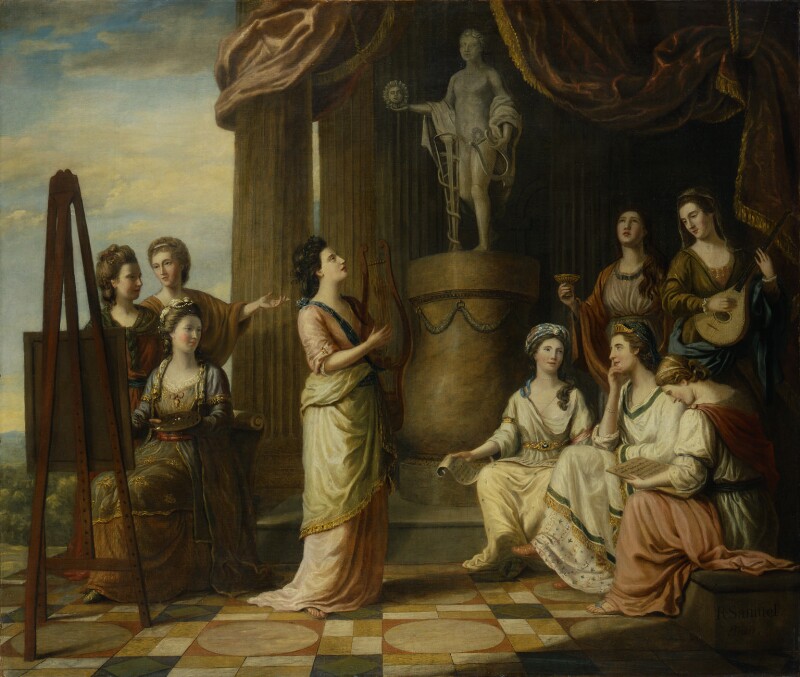This post is part of our Women & History Spotlight Series, which will run through March 2021. Spotlights in this series focus on women's contributions to history in the database.
Authored by: Kandice Sharren and Michelle Levy
Edited by: Kate Moffatt and Sara Penn
Submitted on: 03/12/2021
Citation: Sharren, Kandice, and Michelle Levy. "Women & History Spotlight Series." The Women's Print History Project, 4 Mar 2022, https://womensprinthistoryproject.com/blog/post/65.
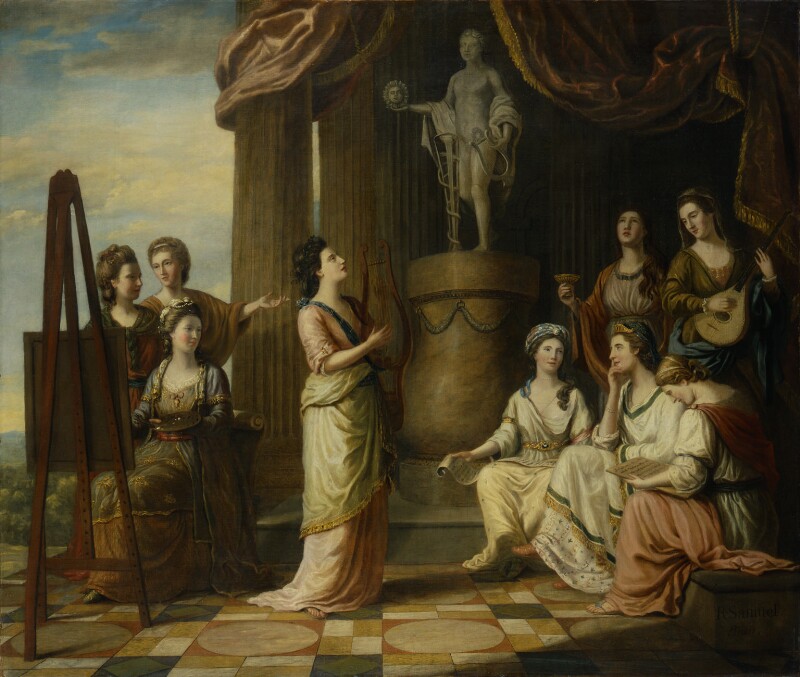
Figure 1. Portraits in the Characters of the Muses in the Temple of Apollo, Richard Samuel, 1778. National Portrait Gallery.
In a dialogue between Anne Elliot, the heroine of Jane Austen’s 1818 novel Persuasion, and Captain Harville, Harville seeks to defend the greater constancy of men by “‘observ[ing] that all histories are against you—all stories, prose and verse.’” Anne disagrees, pointing to the bias of his sources:
‘Yes, yes, if you please, no reference to examples in books. Men have had every advantage of us in telling their own story. Education has been theirs in so much higher a degree; the pen has been in their hands. I will not allow books to prove anything.’
Women of Austen’s day voiced their belief that histories “‘were all written by men.’” They also actively sought to tell their own stories. Our spotlight series for Women’s History Month focuses on just a few of these important and collective efforts, as women took the pen in their hands.
It helps to begin by asking, what precisely is meant by the yoking of women and history? Asked to speak at Cambridge on the subject of “Women and Fiction” in 1929, Virginia Woolf struggled with the capaciousness of the subject, and the question of Women and History is equally large. To paraphrase Woolf’s comments in her lecture, we might say that women and history might mean women and what their history has been; or it might mean women and the histories that they write; or it might mean women and the histories that are written about them; or it might mean that somehow all three are inextricably mixed together. Our spotlight series considers all of these threads, as well as their inevitable entanglement.
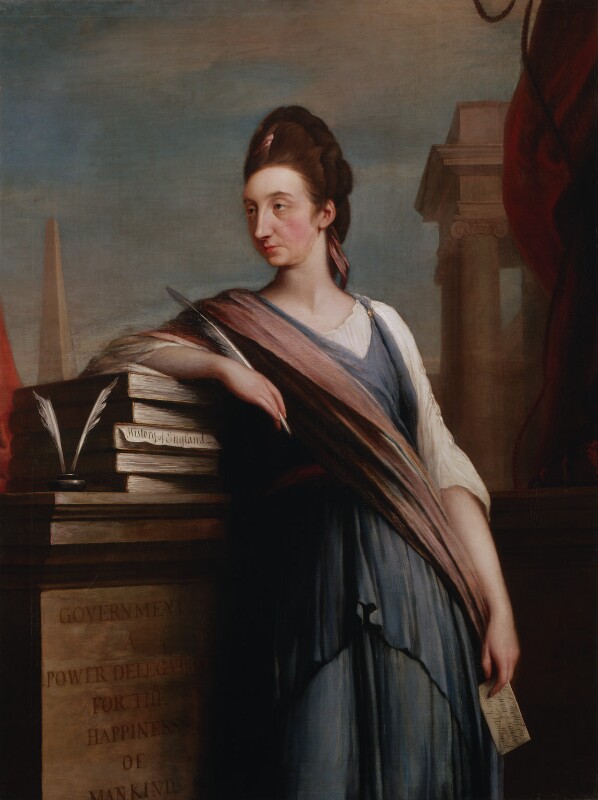
Figure 2. "Catharine Macaulay (née Sawbridge)" by Robert Edge Pine, 1775. National Portrait Gallery.
The spotlight series launches today, March 12, with "Cataloguing Catharine Macaulay," Kate Moffatt’s consideration of Catharine Macaulay’s eight-volume The History of England, which appeared during a twenty-year period between 1763 and 1783. Macaulay is a natural starting point for the series, as her foray into what had formerly been an exclusively male realm stirred controversy. As the first Englishwoman to become an historian, Moffatt considers her use of sources and the reception of her major achievement.
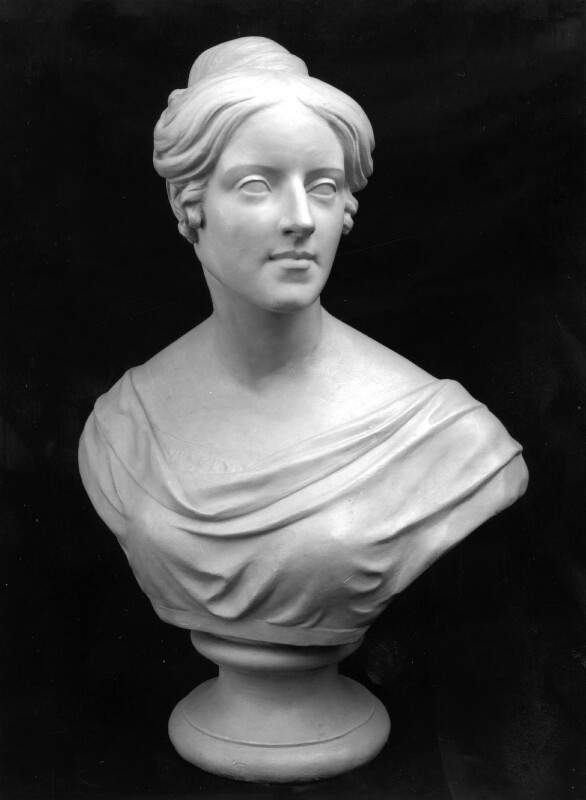
Figure 3. Felicia Hemans plaster bust by Angus Fletcher, 1829. National Portrait Gallery.
On March 15, Isabelle Burrows considers Felicia Hemans’s 1828 Records of Woman. With Other Poems in her spotlight, "Leaving Something Immortal: History in Felicia Hemans's Records of Woman." As Hemans's most commercially successful book of poems, the volume demonstrates her interest in women’s domestic lives, and her belief that it was a “woman’s heart,” that “Outlives the cities of renown” (“Image in Lava”).
On March 19, Amanda Law’s spotlight, "Taking Up the Cause: Mary Hays's Female Biography," will examine Mary Hays’s 6 volume Female Biography; or, Memoirs of Illustrious and Celebrated Women, of All Ages and Countries (1803), which includes records for 300 women.
On March 26 Caelen Campbell's spotlight, "Charlotte Turner Smith's A Natural History of Birds Intended Chiefly for Young Persons," explores women's natural history writing aimed at juvenile readers by way of Charlotte Smith's A Natural History of Birds Intended Chiefly for Young Persons (make sure you check out the illustration of the parrot).
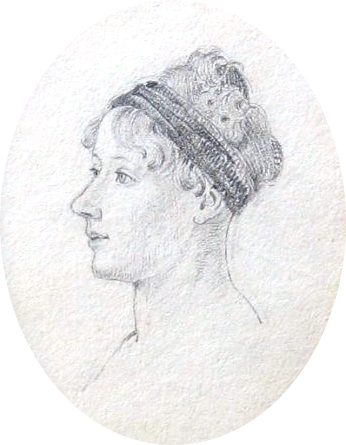
Figure 4. Pencil portrait of Lucy Aikin by Edmund Aikin, undated (Michelle Levy, Lucy Aikin 1781-1864. This portrait is reproduced with the kind permission of Hampstead Parish Church, and the Rev. Stephen Tucker.)
Our spotlight series ends on April 2 with a spotlight on Lucy Aikin by Michelle Levy, "Lucy Aikin, Feminist History, and the ‘Sisterhood of Womankind’." This spotlight brings specific attention to Aikin’s writing on women’s history, her 1810 epic poem, Epistles on Women, Exemplifying their Character and Condition in Various Ages and Nations and her Memoirs of the Court of Queen Elizabeth (1818). Through extensive research, Aikin sought to rewrite histories that had been told about women, from Eve in Genesis to England’s greatest Queen.
This month’s episode of The WPHP Monthly Mercury will also consider how women engaged with capturing history—how it is recorded, curated, influenced, and rewritten. Guest Kate Ozment will be joining hosts Kate Moffatt and Kandice Sharren to talk about Delarivier Manley, author of the famous ‘secret histories’ The New Atalantis and The Adventures of Rivella, which represent fictionalized versions of contemporary political scandals. Tune in on March 17 to listen to Episode 10: A Brief and Scandalous History of Delarivier Manley!
